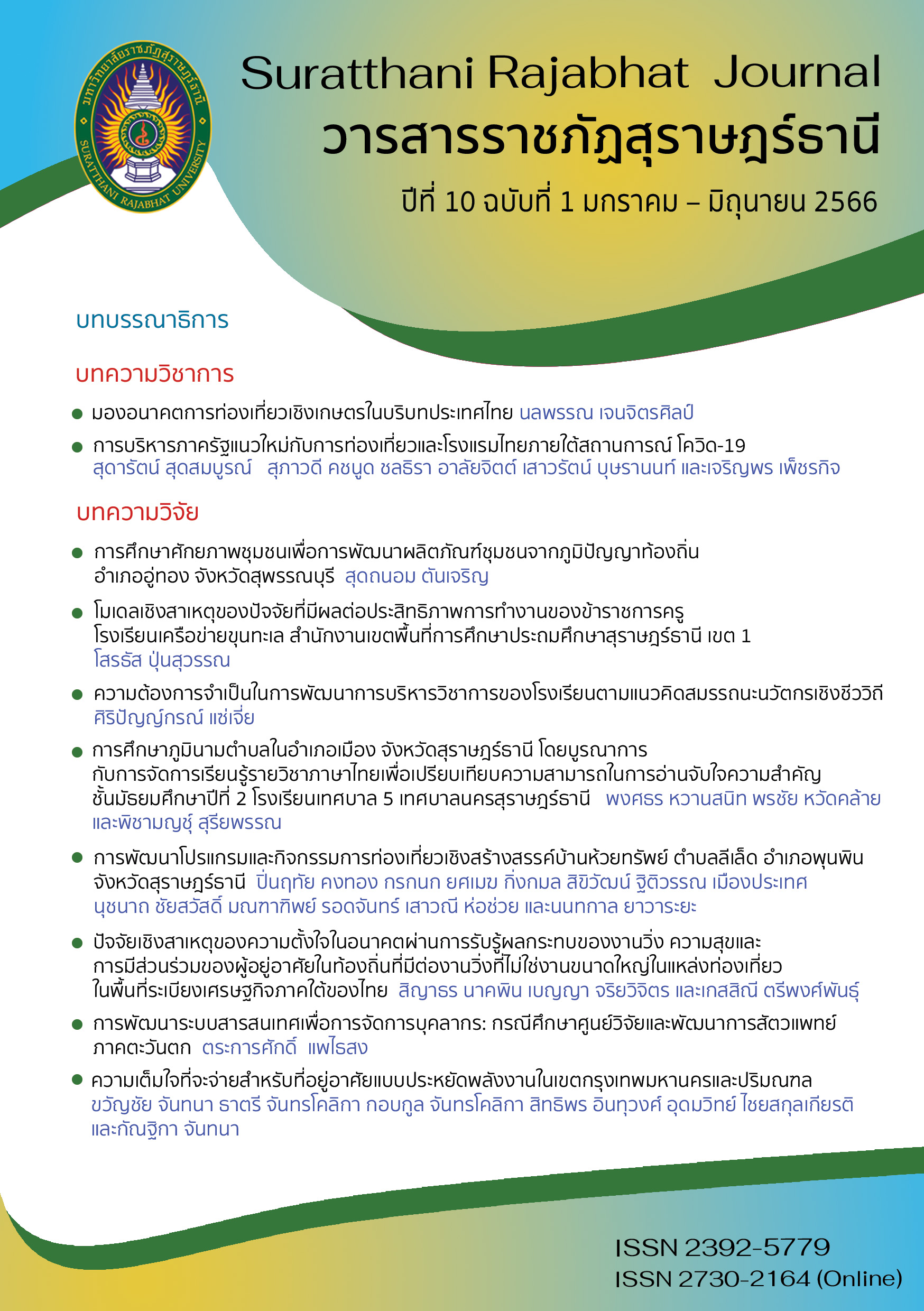ปัจจัยเชิงสาเหตุของความตั้งใจในอนาคตผ่านการรับรู้ผลกระทบของงานวิ่ง ความสุขและการมีส่วนร่วมของผู้อยู่อาศัยในท้องถิ่นที่มีต่องานวิ่งที่ไม่ใช่งานขนาดใหญ่ในแหล่งท่องเที่ยวในพื้นที่ระเบียงเศรษฐกิจภาคใต้ของไทย
Main Article Content
บทคัดย่อ
บทความนี้มีวัตถุประสงค์เพื่อศึกษาปัจจัยเชิงสาเหตุของความตั้งใจในอนาคตผ่านการรับรู้ผลกระทบของงาน ความสุขและการมีส่วนร่วมของผู้อยู่อาศัยในท้องถิ่นที่มีต่องานวิ่งที่ไม่ใช่งานวิ่งขนาดใหญ่ในแหล่งท่องเที่ยว เก็บข้อมูลจาก ผู้อยู่อาศัยใน 4 จังหวัดระเบียงเศรษฐกิจภาคใต้ ประกอบด้วย สุราษฎร์ธานี ชุมพร ระนองและนครศรีธรรมราช จำนวน 397 คน โดยใช้การสุ่มตัวอย่างตามจุดมุ่งหมายการวิจัย ใช้แบบสอบถามที่มีความเชื่อมั่น 0.965 วิเคราะห์สมมติฐานด้วยสมการโครงสร้าง
ผลการวิจัย พบว่า การมีส่วนร่วมในงานวิ่งมีผลต่อความตั้งใจในอนาคตของผู้อยู่อาศัยในพื้นที่งานวิ่ง การรับรู้ผลกระทบของงานวิ่งมีผลกระทบเชิงบวกกับความสุขและการมีส่วนร่วม นอกจากนี้ความสุขของผู้อยู่อาศัยมีผลต่อการมีส่วนร่วมกับงานวิ่งอย่างมีนัยะสำคัญแต่ไม่มีผลต่อความตั้งใจในอนาคต จึงเสนอแนะว่าผู้จัดงานวิ่งควรให้ความสำคัญกับการสร้างความสุขและการรับรู้ผลกระทบของงานแก่ผู้ที่อาศัยในพื้นที่งานวิ่งซึ่งจะนำไปสู่การมีส่วนร่วมกับงานวิ่งและความตั้งใจในอนาคตของผู้อยู่อาศัยในพื้นที่จัดงานวิ่ง
Article Details

อนุญาตภายใต้เงื่อนไข Creative Commons Attribution-NonCommercial-NoDerivatives 4.0 International License.
เอกสารอ้างอิง
Blau, P. M. (1986). Exchange and Power in Social Life 2nd edition. New York: Routledge.
Boonsiritomachai, W., & Phonthanukitithaworn, C. (2019). Residents’ Support for Sports Events Tourism Development in Beach City: The Role of Community’s Participation and Tourism Impacts. SAGE Open, 9(2), 1-15. https://doi.org/10.1177/215824401984341.
Chan, G,S.H. (2015). Perceived Impact of Hosting a Sport Event in a Destination: A Case Study of the Hong Kong Rugby Sevens. Journal of Management and Sustainability, 5(3), 49-60. https://doi.org/10.5539/jms.v5n3p49.
Chen, K.C., Gursoy, D.& Lau, K. L. K. (2018). Longitudinal impacts of a recurring sport event on local residents with different level of event involvement. Tourism Management Perspectives, 28, 228–238.
Cheung, H. (2019). London Marathon: How do you reduce the environmental impact?. https://www.bbc.com/news/science-environment-48064102.
Council for responsible sport. (2019). Green Turns into Silver at Ohio's Air Force Marathon. https://www.councilforresponsiblesport.orgstories/2019/airforcemarathon.
Duan, Y., Mastromartino, B., Zhang, J. J., & Liu, B. (2020). How do perceptions of non-mega sport events impact quality of life and support for the event among local residents?. Sport in Society, 1–20. https://doi.org/10.1080/17430437.2021.1916247.
Evans, M. (2017). Marathons Can Be Dangerous for the Elderly—Who Aren’t Even Running. https://www.wsj.com/articles/marathons-can-be-dangerous-for-the-elderlywho-arent-even-running-1492030802.
Fan, X., Thompson, B. & Wang, L. (2009). Effects of sample size, estimation methods, and model specification on structural equation modeling fit indexes. Structural Equation Modelling: A multidisciplinary Journal, 6(1), 56-83. https://doi.org/10.1080/10705519909540119.
García, F.A., Vázquez, B.A., & Macías, R.C. (2015). Resident's attitudes towards the impacts of tourism. Tourism Management Perspectives, 13(1), 33–40. https://doi.org/10.1016/j.tmp.2014.11.002.
Gibson, H.J., Kaplanidou, K. & Kang, S.J. (2012). Small-scale event sport tourism: A case study in sustainable tourism. Sport Management Review, 15, 160-170. https://doi.org/10.1016/j.smr.2011.08.013.
Gursoy, D., Yolal, M. , Ribeiro, M. A. & Panosso Netto, A. (2016). Impact of Trust on Local Residents Mega-Event Perceptions and Their Support. Journal of Travel Research, 1-14. https://doi.org/10.1177/0047287516643415.
Hair, J. F., Black, W. C., Babin, B. J. & Anderson, R. E. (2010). Multivariate Data Analysis (7th ed.). Upper Saddle River, NJ: Prentice Hall.
Hallmann, K., Kaplanidou, K. and Breuer, C. (2010), "Event image perceptions among active and passive sports tourists at marathon races", International Journal of Sports Marketing and Sponsorship, 12(1), 32-47. https://doi.org/10.1108/IJSMS-12-01-2010-B005.
Homans, G. C. (1958). Social Behavior as Exchange. American Journal of Sociology, 63(6), 597–606. https://www.jstor.org/stable/2772990.
Huang, H., Min, S. D., Wang, T. R., & Mao, L. L. (2016). Social exchange process in collectivistic countries: an examination of sporting events in China. European sport management quarterly, 16(2), 172-189. https://doi.org/10.1080/16184742.2015.1135974.
Hu, L. T., & Bentler, P. M. (1999). Cutoff Criteria for Fit Indexes in Covariance Structure Analysis: Conventional Criteria versus New Alternatives. Structural Equation Modeling, 6, 1-55. https://doi.org/10.1080/10705519909540118.
Kaplanidou, K., Karadakis, K., Gibson, H., Thapa, B., Walker, M., Geldenhuys, S., & Coetzee, W. (2013). Quality of Life, Event Impacts, and Mega-Event Support among South African Residents before and after the 2010 FIFA World Cup. Journal of Travel Research, 52(5), 631–645. https://doi.org/10.1177/0047287513478501.
Kavetsos, G., & Szymanski, S. (2010). National well-being and international sports events. Journal of Economic Psychology, 31(2), 158–171. https://doi.org/10.1016/j.joep.2009.11.005.
Kim, S., Liu, J. D. & Love, A. (2016). The Impact of Event Prestige on Intent to Continue Sport Participation. Journal of Sport Behavior, 39(2), 180–201.
Kim, W., Jun, H. M., Walker, M. & Drane, D. (2015). Evaluating the Perceived Social Impacts of Hosting Large–scale Sport Tourism Events: Scale Development and Validation. Tourism Management, 48, 21–32. https://doi.org/10.1016/j.tourman.2014.10.015.
Kline, R.B. (2016). Principles and practice of structural equation modelling. Guilford Press, New York.
Moon, K.S., Kim, M., Ko, Y, J., Connaughton, D.P. & Lee, J.H. (2011). The influence of consumer’s event quality perception on destination image. Management Service Quality, 21(3), 287-303. https://doi.org/10.1108/09604521111127974.
Morgan, R.M. & Hunt, S.D. (1994). The Commitment-Trust Theory of Relationship Marketing. Journal of Marketing, 58(3), 20–38. https:// doi.org/10.2307/1252308.
Norwak, P.F. & Challmoniuk-Nowak, M. (2014). Running Tourism in Poland Example of Tourist Activity of Polish Marathon Runners. British Journal of Education, Society & Behavior Science, 5(4), 416-425. https://doi.org/10.9734/BJESBS/2015/13374.
Papanikos, G.T. (2015).The Economic Effects of a Marathon as a Sport Tourism Event Athens, Journal of Sports, 2(4), 225-240. https://www.athensjournals.gr/sports/2015-2-4-3-Papanikos.pdf.
Pasanen, K., Taskinen, H., Mikkonen, J. (2009). Impacts of cultural events in Eastern Finland –development of a Finnish event evaluation tool, Scandinavian Journal of Hospitality and Tourism, 9(3), 112-129. https://doi.org/10.1080/15022250903119546.
Poczta, J., DÄbrowska, A., Kazimierczak, M., Gravelle, F., & Malchrowicz-MoÅko, E. (2020). Overtourism and Medium Scale Sporting Events Organizations the Perception of Negative Externalities by Host Residents. Sustainability, 12(2827), 1-24. https://doi.org/10.3390/su12072827.
Positioningmagazine (2019). Running events all over the city, but why would anyone want to organize it?. https://positioningmag. com/1216724.
Schiffman, L. G., & Kanuk, L. L. (1994). Consumer Behaviour (5th ed.). Englewood Cliffs, NJ: Prentice-Hall.
Sheppard, K. (2011). Are Marathons Bad for the Planet?. https://www.motherjones.com/environment/2011/11/marathon-nycgreen/.
Taks, M., Littlejohn, M., Snelgrove, R., & Wood, L. (2016). Sport Events and Residential Happiness: The Case of Two Non-Mega Sport Events. Journal of Global Sport Management, 1–20. https://doi.org/10.1080/24704067.2016.1231925.
Turco, D.M., Swart, K., Bob, U. & Moodley, V. (2003). Socio-economic impacts of sport tourism in the Durban Unicity, South Africa. Journal of Sport & Tourism, 8(4), 223-239. https://doi.org/10.1080/1477508032000161537.
Wicker, P., Hallmann, K. & Zhang, J.J. (2012). What is influencing consumer expenditure and intention to revisit? An investigation of marathon events. Journal of Sport & Tourism, 17(3), 165-182. https://doi.org/10.1080/14775085.2012.734058.
Xing, X. & Chalip, L. (2006). Effects of hosting a sport event on destination brand; a test of co-branding and match up model. Sport Management Review, 9, 49-78. https://doi.org/10.1016/S1441-3523(06)70019-5.
Zhang, J.; Byon, K.K., Tsuji, Y., & Pedersen, P. M. (2020). Co-created value influences resident’s support toward the sporting event through the mediating mechanism of gratitude. European Sport Management Quarterly, 1–23.


